#Cecil Aime
Text


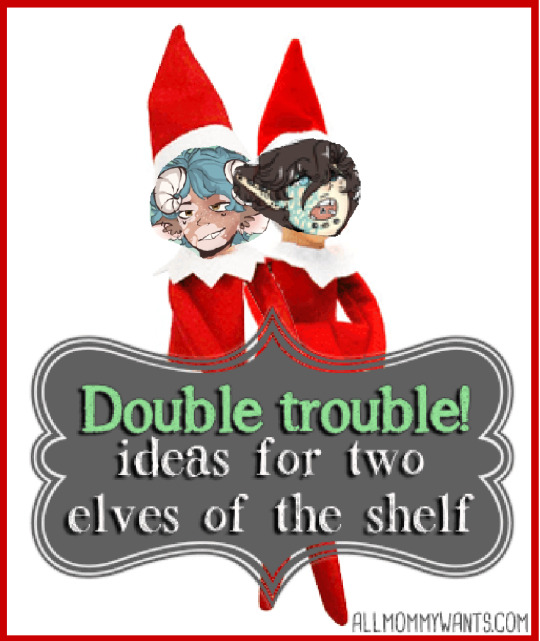





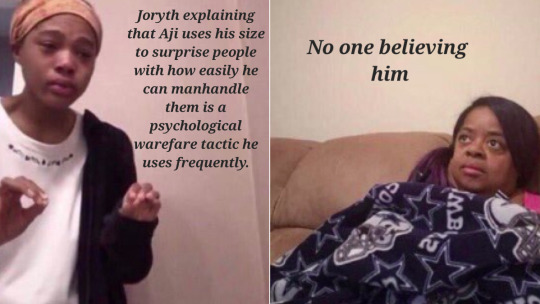
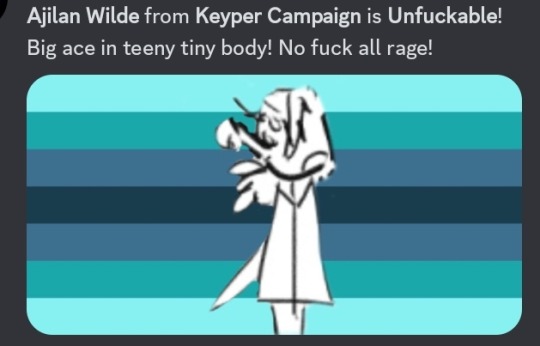
Hi in repentance for my inability to keep arting and posting have campaign memes with mimimal to no context.
#About to slam a blorbo specific one next#not in keyper#dnd#shitposting#im so upset theres one of malefactor and cecil thats love loses and I caNNOT find it#ajilan wilde#cecil aime#joryth yaniver#dort#knife#Aeolos
16 notes
·
View notes
Text
maybe if Canonically Gay cecil palmer wins the sexyman rematch we can take out the pope this time
#vote cecil#we can do this we just#have to aim it properly#cecil palmer#wtnv#welcome to night vale#sexyman rematch#tumblr sexyrematch
2K notes
·
View notes
Text

how i imagine cecil standing when he broadcasts outside of the studio
#wtnv#welcome to night vale#jerma985#cecil palmer#cecil gershwin palmer#trevor this aimed at you specifically
379 notes
·
View notes
Text
Bakura vs. Cecil strangeguy poll has over 11,000 votes with five days left. For comparison the final six-day voting total for Bakura vs. Fiddleford was 7,000 and Cecil beat Vetinari with turnout of less than 3k.
#ofc this implies Cecil ''beat'' Vetinari when the more likely scenario is Vetinari arranged his own defeat#via a series of convoluted plots and misdirections which will somehow in the end accomplish all of his aims and save us all#Havelock Vetinari cannot be ''defeated.'' He loses exactly where he meant to.
87 notes
·
View notes
Text

an out of context page for a lil comic im workin on based on 209 hehe hopefully ill have it done before 210
#im aiming for bitter sweet :-)#hehehe#wtnv#welcome to night vale#cecilos#cecil palmer#carlos the scientist#wip#its a wip#its just gonna be sketchy bc i have lots of stuff im working on
186 notes
·
View notes
Text

tags from @plaguery reading #HELP WHAT IS GOING ON HERE I KIND OF NEED TO KNOW THE LORE HERE #i love one sided emet ships
well the long and short of it is that
cheesecake white-knuckle grips onto her magical girl hero identity in order to not slip into all encompassing despair and so she approaches him with a sort of "well gaius and lahabrea and nabriales and lolorito and ilberd and nidhogg and thordan and yotsuyu and zenos and asahi and vauthry all couldnt be reasoned with and i couldnt change their hearts but im a really bonafide magical girl now, for sure im good enough, and this time emet-selch really sounds like he wants to be friends and for me to change his mind!!!" vibe. but emet selch is also a representative/pillar of the institutions that traumatized her in the first place (shes ilsabardian) so in order to feel like he cant hurt her she has to take him seriously basically 0% of the time, thus rendering him harmless despite his power, because otherwise the dissociative doublethink required to make this selfish, willfully-ignorant choice of interacting with him will crumble, and so will her faith in her ability to comprehensively turn him good.
tldr he's her Prince
#cecil drawls#TY FOR ASKING#cheesecake voice i need emet to be good so i can prove MY goodness so i will treat him like he is not bad at all and call him oji-san and#we will have mahou shoujo times in space :)#meanwhile emet is like MY EX WIFE STILL MISSES ME BUT HER AIM IS GETTING BETTER
14 notes
·
View notes
Text
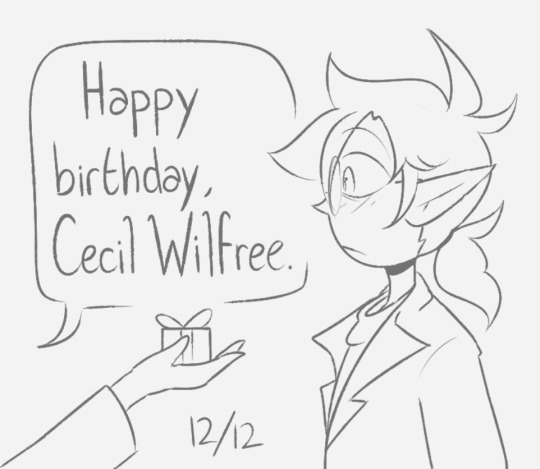
happy birthday to my dnd character whose brain is now in a jar 😭😭😭
bonus:

#dungeons and dragons#dnd#dnd character#dnd half elf#dnd artificer#my silly little alchemist dr cecil wilfree#who was not a doctor but people called him that anyway cause he fiddled with potions#he was a doctor in his heart#if only he didnt get clouded by his own ambition 😔😔😔#then his brain wouldnt be in a jar right now#started off so soft and impressionable and uh he became sad and manipulatable#downward spiral was the name of the game and was aiming for first place#anyway i miss him ;x;
0 notes
Text
updated! ID by @swosheep
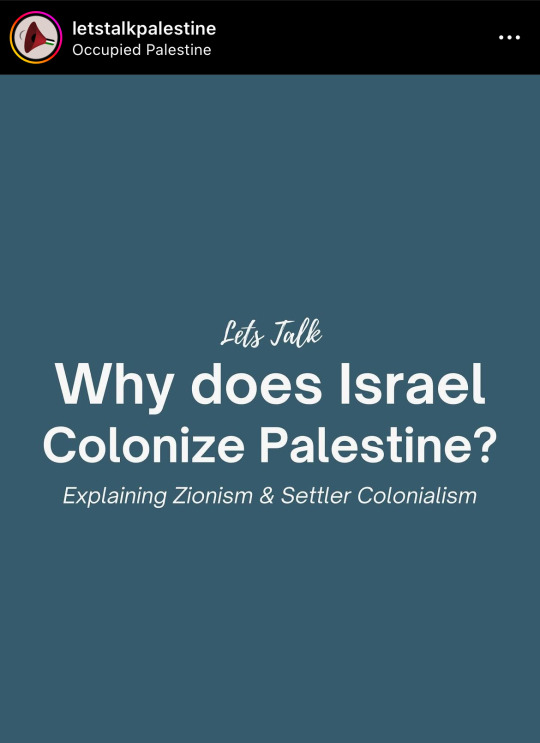
ID 1: all images are screenshots of an Instagram post by letstalkpalestine. The first is a title slide and reads "lets talk: Why does israel colonize Palestine? Explaining Zionism and Settler Colonialism".
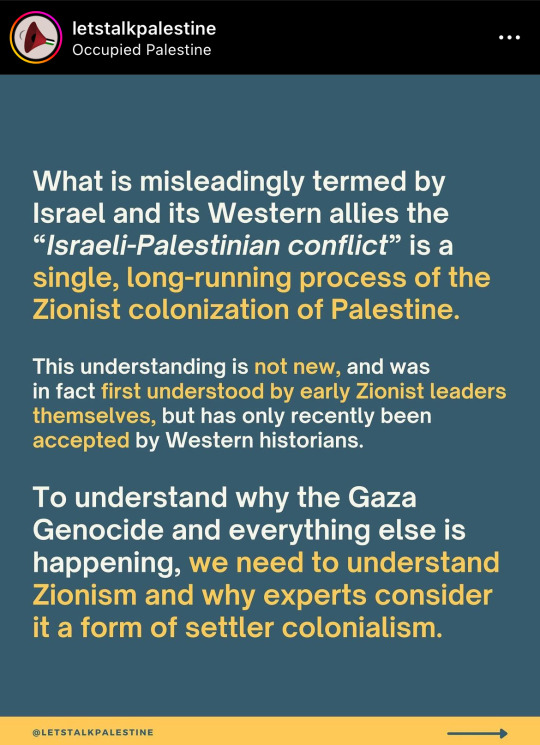
ID 2: the second image reads: "What is misleadingly termed by israel and its Western allies the "israeli-Palestinian conflict" is a single, long-running process of the Zionist colonization of Palestine. This understanding is not new, and was in fact first understood by early Zionist leaders themselves, but has only recently been accepted by Western historians. To understand why the Gaza Genocide and everything else is happening, we need to understand Zionism and why experts consider it a form of settler colonialism."
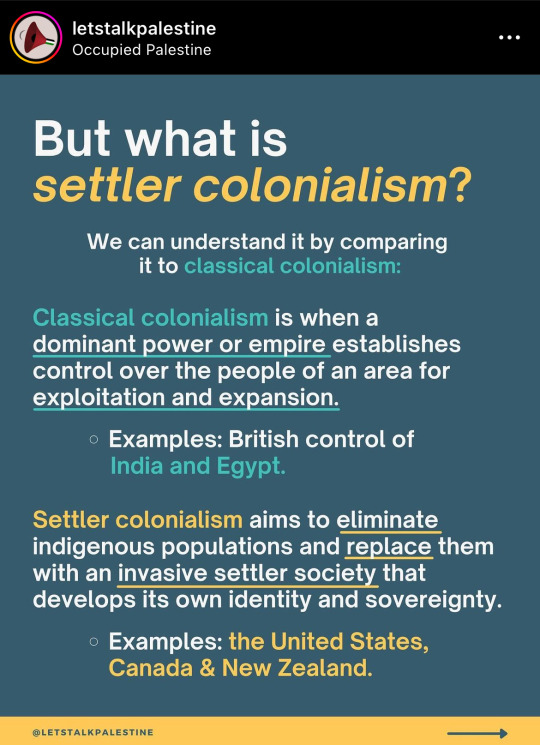
ID 3: the third image is titled: "But what is settler colonialism?" The body text reads: "We can understand it by comparing it to classical colonialism: Classical colonialism is when a dominant power or empire establishes control over the people of an area for exploitation and expansion. Examples: British control of India and Egypt. Settler colonialism aims to eliminate indigenous populations and replace them with an invasive settler society that develops its own identity and sovereignty. Examples: the United States, Canada & New Zealand."

ID 4: the fourth image is titled: "Settler colonialism is different from classical colonialism in 3 main ways:". There is a table comparing the ways. One column of the table is titled: "Settler colonialism" and the 3 points are: "1. Only temporarily & initially relies on the empire for support. 2. Motivated by desire to take over land. 3. Treats new land as a permanent national homeland for settlers." The second column of the table is titled: "Classical colonialism" and the 3 points are: "1. Always dependent on mother empire. 2. Motivated by exploiting natural resources. 3. Uses new land and its resources to serve the empire."
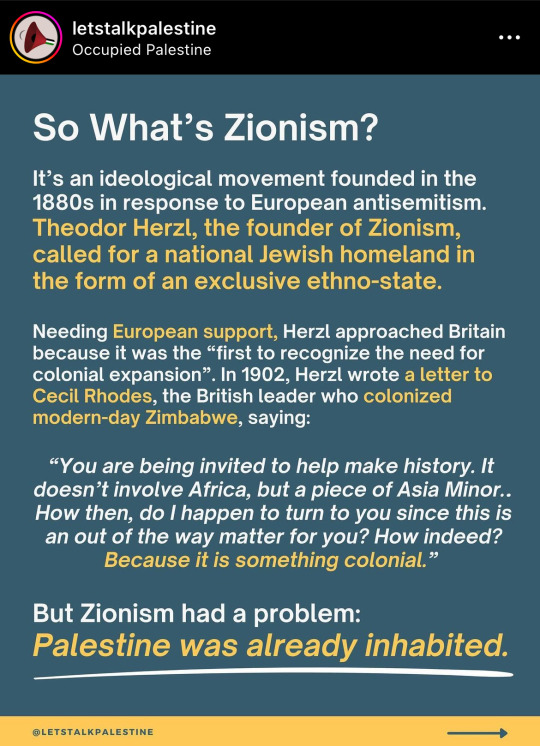
ID 5: the fifth image is titled: "So What's Zionism?". The body text reads: "It's an ideological movement founded in the 1880s in response to European antisemitism. Theodor Herzl, the founder of Zionism, called for a national Jewish homeland in the form of an exclusive ethno-state. Needing European support, Herzl approached Britain because it was the "first to recognize the need for colonial expansion". In 1902, Herzl wrote a letter to Cecil Rhodes, the British leader who colonized modern-day Zimbabwe, saying: 'You are being invited to help make history. It doesn't involve Africa, but a piece of Asia Minor.. How then, do I happen to turn to you since this is an out of the way matter for you? How indeed? Because it is something colonial.' But Zionism had a problem: Palestine was already inhabited."

ID 6: The sixth image is titled: "Zionism & Palestinians". The body text reads: "To establish a Jewish state (israel) in Palestine, Jewish people had to constitute the majority of the population. [quote] 'Only a state with at least 80% Jews is a viable and stable state.' [unquote] -[a quote from] Ben-Gurion, Israel's first Prime Minister. But Palestinians were the majority at the time. For Zionism to succeed, non-Jewish people had to be removed from Palestine and, in turn, Jewish settlers had to take their place. [quote] 'We must expel the Arabs and take their place' [unquote] -[a quote from] Ben-Gurion, Israel's first Prime Minister. This was implemented, and in 1947-1949, Zionist militias conducted a mass campaign of ethnic cleansing against Palestinians - the Nakba. 80% of Palestinians in the heartland were expelled to create Israel's Jewish majority."
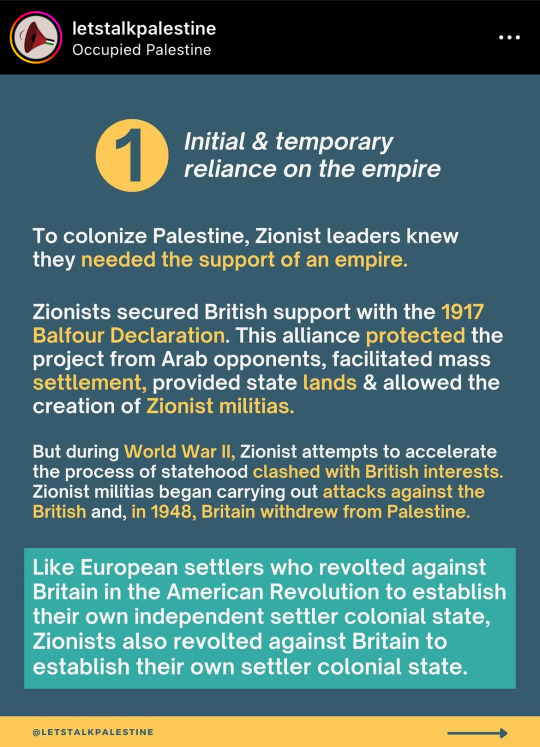
ID 7: The seventh image is titled: "1. Initial & temporary reliance on the empire". The body text reads: "To colonize Palestine, Zionist leaders knew they needed the support of an empire. Zionists secured British support with the 1917 Balfour Declaration. This alliance protected the project from Arab opponents, facilitated mass settlement, provided state lands & allowed the creation of Zionist militias. But during World War II, Zionist attempts to accelerate the process of statehood clashed with British interests. Zionist militias began carrying out attacks against the British and, in 1948, Britain withdrew from Palestine. Like European settlers who revolted against Britain in the American Revolution to establish their own independent settler colonial state, Zionists also revolted against Britain to establish their own settler colonial state."
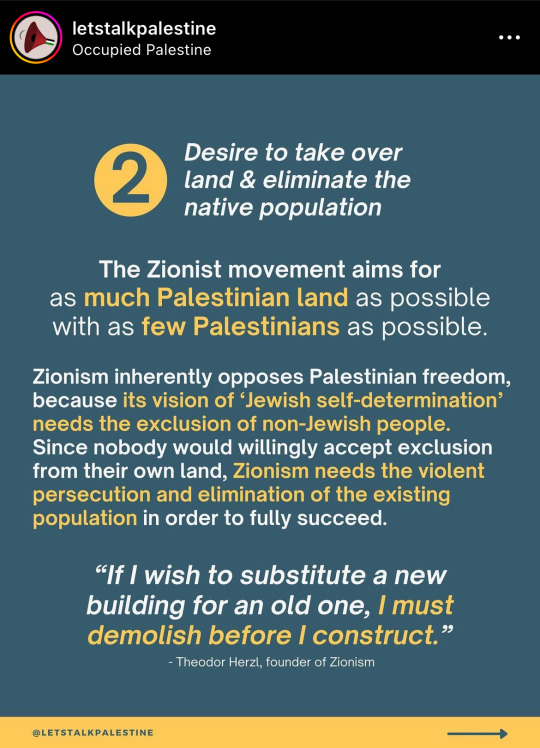
ID 8: The eighth image is titled: "2. Desire to take over land & eliminate the native population". The body text reads: "The Zionist movement aims for as much Palestinian land as possible with as few Palestinians as possible. Zionism inherently opposes Palestinian freedom, because its vision of 'Jewish self-determination' needs the exclusion of non-Jewish people. Since nobody would willingly accept exclusion from their own land, Zionism needs the violent persecution and elimination of the existing population in order to fully succeed. [quote] 'If I wish to substitute a new building for an old one, I must demolish before I construct.' [unquote] - [a quote from] Theodor Herzl, founder of Zionism".

ID 9: The ninth image is titled: "3. Permanent homeland". The body text reads: "Zionism's goal wasn't to establish a temporary base for an empire but a permanent homeland for a new settler population. To create a new society in a populated country, Zionists claimed Palestine by moral & divine right, an example of the 'Logic of Elimination'. A pillar of settler colonialism, the 'Logic of Elimination' is when settlers develop moral justifications to eliminate the native population. Zionist talking points like - 'Palestine doesn't exist'; - 'israel made the desert bloom'; - 'israel is technologically advanced'; are used to justify the elimination of Palestinians. Such points were used in other cases of settler colonialism like South Africa, with the 'Empty Land' myth arguing that Black people arrived in South Africa at the same time as white settlers."
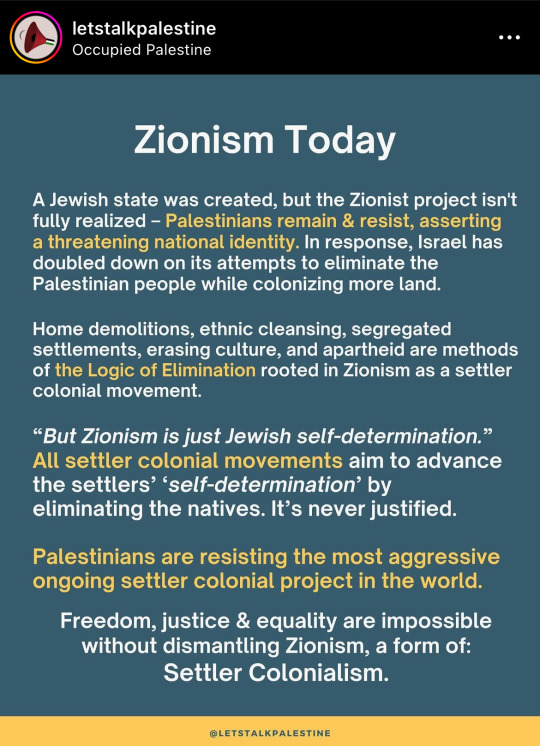
ID 10: The tenth image is titled: "Zionism Today". The body text reads: "A Jewish state was created, but the Zionist project isn't fully realized - Palestinians remain & resist, asserting a threatening national identity. In response, israel has doubled down on its attempts to eliminate the Palestinian people while colonizing more land. Home demolitions, ethnic cleansing, segregated settlements, erasing culture, and apartheid are methods of the Logic of Elimination rooted in Zionism as a settler colonial movement. 'But Zionism is just Jewish self-determination.' All settler colonial movements aim to advance the settlers' 'self-determination' by eliminating the natives. It's never justified. Palestinians are resisting the most aggressive ongoing settler colonial project in the world. Freedom, justice & equality are impossible without dismantling Zionism, a form of: Settler Colonialism."
#reaux speaks#zionism#free palestine#free gaza#gaza#genocide#palestine#settler colonialism#great britain#history#ethnostate#ethnic cleansing#anti zionism#resources#instagram
193 notes
·
View notes
Text
Transcribing the Oscar Wilde Questionnaire
Because nearly every response is a gem. (Here's a link to a high-res photo of the questionnaire, completed by Wilde in 1877)

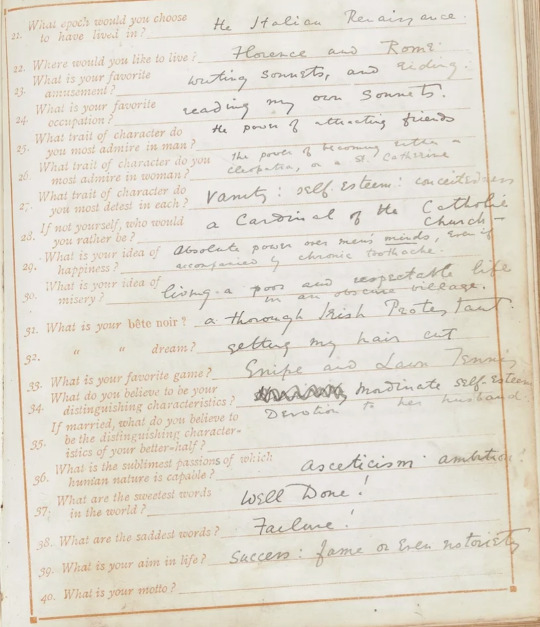
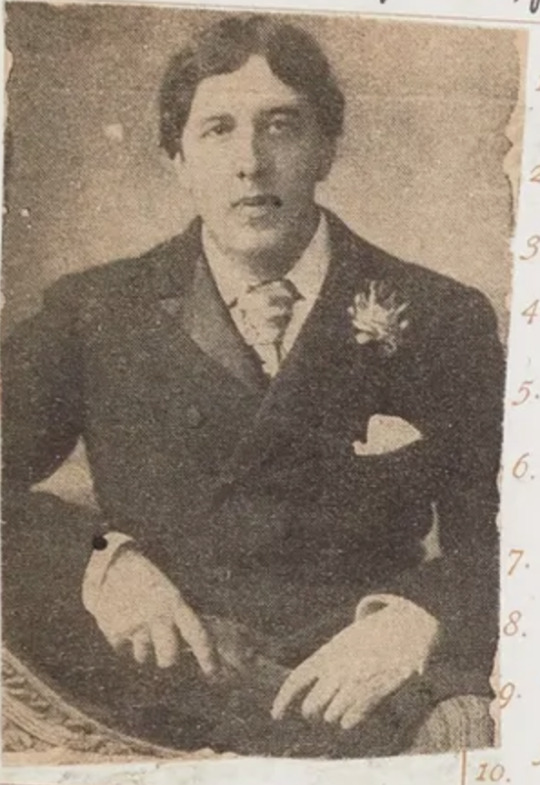
N: Oscar Fingal O'Flahertie Wills Wilde, 1877
Your Favourite
Colour? couleur de rose (often a [red?]).
Flower? Lilium Auratum
Tree? Stone Pine and Lemon Tree
Object in nature? The sea (when there are no bathing machines)
Hour in the day? Post hour.
Season of the Year? Beginning of autumn.
Perfume? almond blossoms
Gem? Sapphire in winter / Diamond in summer.
Style of Beauty? that of Guido [Reni]'s St. Sebastian and of the "Venus of Melos [sic - Milo]"
Names, Male and Female? Eucharis, Florence, Cecil
Painters? Fra Angelico; Turner; Caravaggio.
Musicians? Mozart, Gounod, Chopin.
Piece of Sculpture? Apoxyomenos of Vatican.
Poets? Euripides, Keats, Theocritus, and myself.
Poetesses? Sappho and Lady [Jane] Wilde
Prose Authors? Plato and John Ruskin.
Character in Romance? Achilles; Nausikaa
[Character] in History? Dr Newman. Alexander.
Book to take up for an hour? I never take up books for an hour.
What book (not religious) would you part with least? my Euripides.
What epoch would you choose to have lived in? the Italian Renaissance.
Where would you like to live? Florence and Rome.
What is your favourite amusement? writing sonnets, and Riding.
What is your favourite occupation? Reading my own sonnets .
What trait of character do you most admire in man? the power of attracting friends.
What trait of character do you most admire in woman? the power of becoming either a Cleopatra, or a St. Catherine
What trait of character do you most detest in each? Vanity; self esteem; conceitedness
If not yourself, who would you rather be? a Cardinal of the Catholic Church
What is your idea of happiness? Absolute power over men’s minds, even if accompanied by chronic toothache.
What is your idea of misery? living a poor and respectable life in an obscure village.
What is your bête noir [sic]? a thorough Irish Protestant
What is your dream? getting my hair cut
What is your favorite game? Snipe and Lawn Tennis
What do you believe to by your distinguishing characteristics? [the word “humility” is scribbled-through] inordinate self-esteem
If married, what do you believe to be the distinguishing characteristics of your better-half? Devotion to her husband [Note: written high in margin as cheeky reference to response in #34]
What is the sublimest passions of which human nature is capable? asceticism; ambition
What are the sweetest words in the world? Well Done!
What are the saddest words? Failure!
What is your aim in life? success, fame or even notoriety
What is your motto? [No response]
#oscar wilde#wilde#literature#poetry#my take: he has excellent taste but is also a Basic History Gay. Respect.#What is the sublimest passions of which human nature is capable? ‘asceticism’ 👀#a genuinely interesting response assuming he’s not joking
251 notes
·
View notes
Text
i was talking to keri the other day and i realized that the way carlos defined his intentions for being in night vale is very specific.
in the very first episode, cecil reports: “Carlos told us that we are, by far, the most scientifically interesting community in the US, and he had come to study just what is going on around here.”
(this gets really out of hand so be warned)
i thought it was interesting that carlos highlighted that what was scientifically interesting was the community of night vale. that he came to study what is going on in night vale. i thought maybe this could just be weird wording, so i. i did read through every mention of carlos in the transcripts from episode 1 up to the most recent episode.
the next time we hear about carlos’ reason for being in night vale is in episode 25, when cecil says, “[Carlos] came to us to investigate our town, because he said it was scientifically extraordinary, and downright bizarre.”
interesting that carlos is investigating the town, and that he finds the town extraordinary and bizarre. it is repeated multiple times that night vale is the most scientifically interesting community. “Community” is the word used every time.
also of note is how carlos describes the desert otherworld. he calls it “the most scientifically interesting place in the otherworld” (58). he also says that his time there is “the most scientific. I don’t think I’ve ever been more scientific, and you know how much I love science.” (59).
i point this out because carlos calls the otherworld the most scientifically interesting place, not community. part of this could be that there wasn’t much of a community in the dow at this time, but there were still people out there with him, but i think this wording is intentional. he even corrects kevin on this later: “Kevin: I think you once called this desert otherworld ‘the most scientifically interesting community in the U.S.’ Carlos: Well…no, my exact words were–” (70a).
i also point out that carlos emphasizes how scientific his time in the dow is because it seems as if it is a significant difference from what he had been doing in night vale- almost as if the nature of his research had changed from studying a community to a place.
later, when reflecting on his arrival in night vale, carlos says, “When I came here, I understood this town as scientifically fascinating” (111). again, the emphasis is that the town is what’s fascinating. the community.
in this most previous arc, we get even more insight into this idea. carlos has come to define for night vale what science looks like (which i could and will go on and on about at a later date). this is widely acknowledged- carlos is repeatedly referred to as the towns leading scientist, as the scientist (which, i know, its by cecil, not a reliable narrator, but thats the narrator we got and im taking his word as bible). when the uowii comes in and starts doing science differently, cecil contrasts their work with that of the night vale community college, saying, “See, this is what real science is all about. Dangerous, frightening experiments conducted on an unknowing populace with a vague aim and no clear end date” (223). and, yeah, this def sounds like a cecil/night vale little quirk, seeing that cecil is. intimately familiar with how the. top scientist does his work (sorry), i think it’s worth noting that he sees science as something done to a populace. i might be stretching with that one but i dont care.
then, when lubelle is directly addressing carlos, she says, “I knew you when you got it in your head that there was somewhere in the great deserts of the United States a town that was the most scientifically interesting community in the country. Oh the attention you got for this so called discovery, nonsense though it was. You got headlines, you got grants, an entire research team for this fully funded expedition” (230). she says again, community. he got grants and attention and headlines for discovering this community (which does make me wonder what he was putting out there to get headlines and attention. or how he found night vale to be credited with discovering it. again, a post for a later date).
now to what im trying to get at.
i do think it matters that carlos is coming to study the community of night vale. when lubelle gets to town, she jumps right into trying to find the most interesting thing, the biggest scientific breakthrough. when carlos gets to town, one of the first things he does is call a town meeting. he tells the town why he’s there. he warns the town of things that might harm them, investigates that which is actively affecting the community.
i think of the anthropological nature of that idea- of studying a community. of entering a community you find interesting, declaring your intent, and trying to learn what you can about how the community works. to learn about the culture. to be curious about how things move in that world.
i think about carlos trying to distance himself from marine biology, from the phantom ocean, and deciding that studying a community of people in the middle of the desert just might be different enough for him to reignite his passion for science and research.
i think that its really interesting how actively carlos resisted becoming personally entangled with anyone in town, with cecil especially. we know carlos liked cecil fairly quickly, but didn’t move as fast as cecil hoped. i think it’s really interesting that carlos defines home as “a grouping of objects connected by a shared personal experience of time” and a town as “a collection of objects and people, no more meaningful than any other” (100, 210). those definitions seem very distant to me. i think it’s really interesting that carlos was so resistant to the idea of calling night vale his home town.
i think, if someone had come to a town intending to study the community, they would be very wary of becoming too involved in the community, of putting their results at risk. studying strange phenomena would be excusable, especially for someone who deeply believes “science is a tool, helpful and dangerous, but we will use it only for our fellow humans, with the benefit of the least of us always in mind” (230). but becoming involved personally, allowing personal biases to sully the objectivity of the research, tainting the data with something as unscientific as feelings- this would be unacceptable to someone who saw science as the ultimate motivation.
i just think it matters that this wording is repeated. i think it matters that carlos spent years terrified of calling night vale his community, because it was one he was only ever meant to research. one he was only ever meant to report on. like. a certain someone who has also had to shift the nature of his work because of a man he fell in love with.
i think it matters that carlos recognizes when he has let his scientific integrity slip, when he calls himself “complacent” for “no longer see[ing] the strangeness, but only [his] home” (111). i think it matters that carlos comes to realize that sometimes, an explanation takes away the fun of things (it devours), that even if the sun doesn’t set at the right time, “the sunset was really beautiful, so at least there’s that” (111). that a magic trick doesn’t need to be explained (222), that every mystery of the strange community he is studying doesn’t need an explanation. that his focus was not on tearing apart the community in the search of truth, but “the science of discovery, of research, of humility, of using these tools to make our lives better” (230).
i think it matters that, even as carlos did become irrevocably involved in the community he was meant to study, he always made sure to keep “most of its mysteries… intact” (212). he still maintained that level of scientific integrity, and pushed to reinforce this when people threatened to do otherwise.
i think it matters that carlos, when faced with someone from his past, someone who knew exactly why he was there and exactly what he had left and exactly what the correct scientific procedure is, says, “I speak now not to my adversary, but to my community” (230). his community. yes, the most scientifically interesting community in the united states. yes, the community he had come to study. yes, the community he had, somewhere along the way, become a part of. and yes, his community.
i think this is such a cool example of character development, and maybe i just couldn’t fully appreciate or understand the importance of him saying “community” every time without what was revealed in this last arc, but i really like considering this angle. i love thinking of carlos trying to remain distant before realizing his community, his love, his family had all become one, and he could still find wonder and make scientifically interesting discoveries from within the community. i love that he found a home, one much more personal than simply a grouping of objects and people, but a community that is his.
#um. i think about carlos a regular amount.#shoutout to keri and bulk for encouraging this. it's their faults. blame them.#wtnv
134 notes
·
View notes
Text
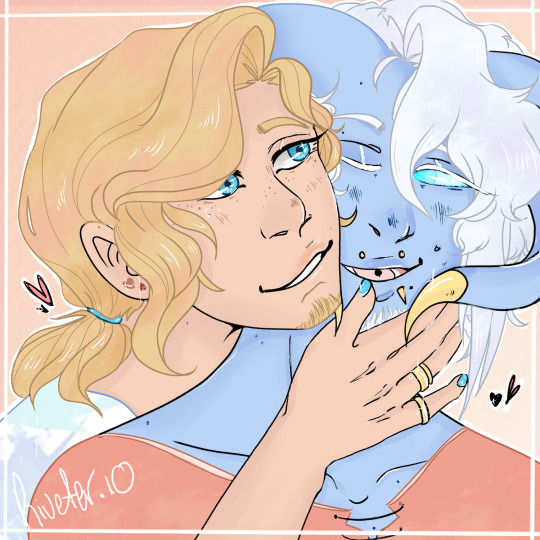
@humanmaybee Get fuCKIN A R T F I G H T ATTA C K E D💚
3 notes
·
View notes
Text
Source Separation for Introjects
Hello - it’s time for me to make a post here based on my own experience. We get asked occasionally how to go about source separation for those who are interested, and in our system, I (Cecil) am the only one who has achieved this to the degree of which I feel confident enough to write this post. So here we go.
I’ll format this in the way we’ve been formatting our other informational posts, because I’m fond of the question-and-answer format.
DISCLAIMER: The information shared here is from our own system’s experience. And particularly my (Cecil’s) experience. No two systems are alike, and further, no two introjects are alike either. What worked for me may not work for you. I am not trying to portray any information as absolute truths - only my experience with source separation as I understand it.
What is a source?
In plural contexts, a source refers to the person, character, concept, or item that an introject is based off of. Introjects are headmates who arrive in their system with an identity already based off of something outside of the system. An introject’s source is whatever they are based off of.
For example, my headmate Ralsei is a fictive based off of the character Ralsei from Deltarune. Therefore, the Ralsei character in the video game is my headmate’s source. My own source is Kim Kitsuragi from Disco Elysium.
What is source separation?
Source separation occurs when an introject aims to distance themselves from their source and form their own identity outside of their source in the process. Source separation can be small, like enjoying an activity or media that your source was never interested in. It can also be greater, like changing your name, appearance, and other identifying features.
Even recognizing that you are not your source - that your source exists outside of yourself and that you are your own person - can be considered source separation. In this way, source separation, even to the smallest degree, can be healthy and beneficial for many introjects.
Why should I separate from my source?
There are a plethora of reasons why an introject may choose to separate from their source. Whether being compared to their source brings them pain or anxiety, they have difficult exomemories to bear, they want to focus on improving themselves or simply wish to have more agency over their lives, there is no clear set of reasons why an introject should separate from their source. The purpose of this post is not to convince introjects that they must separate from their source - rather, my goal is to explain a bit about what source separation means to me.
How do I source separate?
Introjects may distance themselves from their source in a plethora of different ways. No two introjects are alike, so one introject’s method for source separation may not work for another. That being said, here are some ways that I have separated from my source (written with general “you”s).
1. Recognize that you are not your source.
You are not your source physically, mentally, emotionally, or in any other capacity. You exist outside of your source. If your source suddenly vanished or ceased to exist, you would still be here. You are capable of thinking for yourself and making decisions that your source wouldn’t necessarily make. For me, this first step was crucial. For some, this level of source separation is enough for them to live happy lives. In our system, Ralsei is comfortable still identifying as and with Ralsei from Deltarune, while recognizing that they are not literally their source. For me, though, this just hasn’t been enough.
2. Make small changes… consciously.
After I first learned I was a fictive, I found myself drawn towards things that my source was known to enjoy. Once I decided to try and separate from my source, I started branching out with my interests and tried exploring new things without holding myself to the standards set by the character I was based off of.
You might choose to try baking, coding, rock climbing, building puzzles, or anything else that speaks out to you. Don’t let discomfort deter you from trying something new - it’s normal for things outside our comfort zones to be uncomfortable. Experiment with your likes and dislikes, favorite things and activities, and all sorts of things - don’t let your source or your feelings about your source dictate what you’re capable of enjoying. Finding things to be passionate about can not only help you separate from your source, but enrich your life in the process.
3. Make larger changes, and lean into them.
After you’ve managed to find a few ways to distinguish yourself from your source, if you’d like, you can make bigger changes. This may include changing your name, experimenting with your gender and sexuality, altering your appearance, or finding other, lasting ways to make yourself different from your source.
I did this by changing my name and experimenting with my gender. I also am toying with the concept of otherkin, and am questioning if I even experience the world in a human way. While I still use my source’s pronoun set, I also am comfortable with neopronouns, with a keen interest in xe/xem/xers. This is different from my source, who used exclusively he/him pronouns. By steadily making changes about how you behave, view yourself, and interact with the world around you, you can further distinguish yourself from your source and develop into your own individual personhood.
4. Understand personhood is complex and identities are fluid.
You may wake up one day feeling more like your source than other days. This isn’t a sign that you haven’t been successful so far at separating from your source. Progress is not linear, and this goes for those attempting source separation as much as anything else. Be patient with yourself - recognize that making these changes will take some time getting used to. It may take weeks, months, or even years for you to reach a degree of separation from your source that brings you comfort and joy. Please don’t give up if it’s looking hopeless. A little patience and self-compassion can go a long way in this regard.
And there you have it. Of course, in my experience, being able to speak openly about my source separation with my system’s therapist has helped this process go much more smoothly. If you have a therapist in your life, or someone you trust who you can talk to, speaking with them about your process and how your separation is going may be incredibly beneficial. Journalling and keeping track of your progress in other ways can help give you hope when you worry you haven’t been capable of making much change. In the end, it is up to you as an individual to decide how to separate from your source and how much separation you hope to achieve.
Do I have to separate from my source if I don’t want to?
No. While at least some amount of separation is certainly healthy (see: step 1 of “How do I source separate?”), no one should ever be required to separate from their source if they’re not ready or if they don’t want to. This post is not a plea to convince introjects to separate from their sources. Rather, it is a rough guide for those who are already interested in or curious about this process.
Questions or comments may be directed to me, Cecil. Full disclosure, I am in the process of attempting to fuse with another member of my system. Therefore, that member (Margo) has been present with me as I wrote this post. Fusion doesn’t destroy alters, though, so if you have any questions we can still collectively provide a response, even after our fusion. We’re going to be undergoing a name change soon - so if you hear back from Corrie - that’s still me. That is the name Margo and I have chosen for our collective, shared identity.
I hope this post will be beneficial for those who are interested in source separation. Remember to take things slow, don’t hold yourself to unrealistic expectations, and show yourself kindness and compassion along the way. If you want it, source separation is certainly possible! And we wish you all the best as you attempt to distinguish yourself from your source.

(Image ID:) A pale orange userbox with a cluster of multicolored flowers for the userbox image. The border and text are both dark orange, and the text reads “all plurals can interact with this post!” (End ID.)
54 notes
·
View notes
Note
May I request a Schneider npt?? (*^ワ^*)

schneider ( reverse : 1999 ) id pack




names : vie , vita , plume , pluma , pistoille , syn( ne ) , crimson , mahogany , bernadette , devotee , maple , souvenir , droite , recuerdo , amante , sharpshooter , mort( e ) , naranja , colette , cecil( e ) , blossom , bloom
pronouns : sin / sins , feather / feathers , bullet / bullet , pistol / pistols , blood / bloods , pearl / pearls , lo / love , love / loves , admire / admires , admire / admiration , heart / hearts , shoot / shoots , aim / aims , death / deaths , dove / doves , bang / bangs


#♥︎ we are now on the record .#♡ how do you plead ?#mogai community#mogai blog#mogai safe#mogai friendly#mogai#name ideas#name suggestion#names#name suggestions#name list#pronoun ideas#pronoun list#pronoun suggestions#pronoun suggestion#pronouns#neopronoun suggestion#neopronoun suggestions#neoprns#neopronoun ideas#neopronoun list#neopronouns#xenopronoun suggestion#xenopronoun suggestions#xenopronoun list#xenoprns#xenopronouns#id pack#schneider reverse 1999
32 notes
·
View notes
Photo
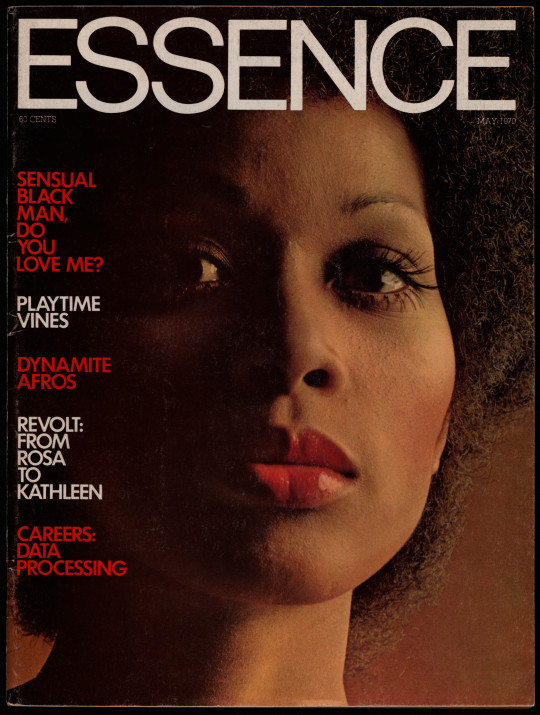
This year we’re celebrating #BlackHistoryMonth with the Husni Collection. Essence was the brainchild of Jonathon Blount, a young black salesman. At the time, most of the profitable Black magazines were being produced by activist social organizations, with religious denominations and academics producing smaller magazines. Blount saw an opening for a magazine aimed specifically at Black women, and in 1970 he joined forces with another salesman, Cecil Hollingsworth, as well as the financial planner Edward Lewis and the printing expert Cyril Hill to produce Essence, with the photographer Gordon Parks as their editorial director.
(via Beauty and Fashion Magazines · Life in America: Sixteen Black Magazines from 1953 to 1998 · Special Collections and Archives)
#blackhistory#blackhistorymonth#essence#magazine history#history of journalism#special collections#rare books#mizzou#university of missouri#john henry#husni collection
24 notes
·
View notes
Text
So here's a concept I've had in the back of my mind for a while. I was thinking: "What if AG wrote follow up books aimed at adult collectors who grew up with AG?"
The books would basically consist of the girls we already know and love and follow up on thier life all these years later. I decided to make thier new age in these hypothetical books exactly 30 years old.
It would show how they have grown, what they would be like as adults, if they have started thier own family or not, ect.
If AG were to do this I'm not sure how many characters they would include. Likely only the original 6 and maybe Kaya and Kit too. But for the sake of this post I included everyone. Here is the new dates they would represent at 30 years old:
Kaya: 1785
Felicity: 1795
Caroline: 1832
Josefina: 1845
Marie Grace and Cecile: 1873
Kirsten: 1875
Addy: 1885
Samantha: 1925
Rebecca: 1935
Claudie: 1945
Kit: 1953
Nanea: 1962
Molly: 1964
Maryellen: 1975
Melody: 1984
Julie: 1996
Courtney: 2006
Twins: 2020
Wow those last two really showed how recent thier stories are in history.
Anyway it is interesting to see how some girls dates overlap with other girls original dates.
It would very cool to see how the perspective would be different between an adult woman's eyes vs how we see it already in the original story. (for example, Kits perspective as an adult in the 50s after growing up in the depression and living through the war vs maryellens childlike view on it, or Rebecca living in NYC in the 30s, maybe as a actress vs Kit living in ohio as a child, etc)
So what do you guys think of this idea? Would you read it?
18 notes
·
View notes
Text
The Boer War (1899-1902)
If the 1897 Diamond Jubilee is seen as the zenith of the British Empire, the Boer War is arguably the start of its collapse.
There are two conflicts with the name "Boer War", of which the second is by far the better known.
"Boer" is Afrikaans for farmer. The two wars are known as "the Freedom Wars" in the Afrikaans language and "the South African War" in the country itself.
More specifically, the Boers were Dutch farmers who emigrated from the Dutch and then British-controlled Cape Colony north and east into the Transvaal region that is now north-east South Africa, to get away from what they saw as an oppressive government. As well as the fact that the British abolished slavery, which they wanted to keep. So yeah. They were more specifically known as "Trekboers" or travelling farmers. Trek is of course where we get the term Star Trek from.
The first conflict from 1880-1881 started after a farmer refused to pay an illegally inflated tax, had his wagon seized - and his friends then assaulted the auction.
The Boers, better equipped, better trained and far more experienced at shooting than their British opponents, managed to defeat the latter in three major engagements. Unwilling to become engaged in a major conflict, London negotiated a peace deal that gave the South African Republic effectively full control over internal affairs, although the British retained control of external relations. This was the first time the British had lost a war to rebels since the American War of Independence.
Then gold was found in the region and an influx of immigrants, mostly British, turned up, seeking their fortune. Johannesburg emerged as a major community overnight. This caused a lot of tensions, even more so when the government in Praetoria (the SAR capital) denied the 'uitlanders' civil rights.
In 1896, Cape Colony Prime Minister Cecil Rhodes authorised Leander Starr Jameson to conduct a raid into the territory with the aim of triggering a revolution. The raid was badly botched, failed and caused massive embarrassment to the British government, especially when Kaiser Wilhelm II sent a congratulatory telegram to the SAR government... and telegrams showing Rhodes' involvement were found. Jameson, while lionised in the press, spent 15 months in Holloway for the raid.
Shortly after this, the Second Matabele War saw the British have to deal with an uprising by the Ndebele and Shona peoples in what is now Zimbabwe. They defeated it, but with many losses on both sides.
Tensions between the British and the Boers continued to grow after the Jameson Raid; the uitlanders did not see their rights improve, the Boers mistreated the African population, and a lot of the British establishment thought it would be an easy victory. The generals, for their part, did not.
The SAR had acquired high quality weaponry from Germany and France, including bolt-action Mauser rifles. The British Army for its part was in dire need of reform.
The war broke out in 1899 after an ultimatum from SAR leader Paul Kruger for the British to withdraw their forces from the border. The SAR had allied with the Orange Free State by this point.
The Boers had formed civilian militias called "commandos". They launched an invasion of the Natal and Cape Colony, soon putting British garrisons under siege. One notable such siege was at Mafeking, where the British commander was one Robert Baden-Powell, whose use of scouting, along the deception to make his defences look better than they were allowed his force to hold out for 217 days until relieved. He would later use his experience in scouting to form, well, the Scouting Movement.
After a series of major reverses, it was clear the British were going to need to send major reinforcements, recruiting a lot of volunteers - the biggest overseas force Britain had sent to date. They also removed their local commanders and put new ones in.
The sieges were lifted and Praetoria was captured on 5 June 1900 - at which point the Boers (along with foreign volunteers) moved to guerilla warfare, something that they were very adept at, in stark contrast to the British. However, harassment is not the same as taking and holding ground.
Both forces tried to minimise the involvement of people of colour due to fear of what would happen if they armed Africans, but personnel shortages meant they ended up being involved anyway, usually in supporting roles. Mahatma Gandhi, who was a civil rights activist there, formed a corps of volunteer stretcher bearers from the Indian population.
Realising that they were only controlling the territory that they were physically in, the British changed their tactics.
Firstly, they built fortified blockhouses and armoured trains to control their supply routes.
Secondly, the British adopted a "scorched earth" policy; they rounded up Boer and African civilians, placing them in concentration camps, while also systematically destroying farms, crops etc. that the Boer forces could use to supply themselves.
The Spanish had used concentration camps in Cuba earlier in the 19th century, but this was a much wider use. With little or no soap, along with dirty water, disease swept through the overcrowded camps, with over 46,000 dying in them, including a quarter of the Boers in them - African numbers interned were not properly counted. Emily Hobhouse exposed the horrific conditions, and the matter was taken up by domestic politicians. A government commission led by Millicent Fawcett then recommended major improvements, which were largely implemented and brought down the death rate, but the damage had been done by this point.
The brutal tactics were sadly effective; the Boers were beginning to give up. However, the British themselves were running out of time and money, so gave them a generous settlement in the 1902 Treaty of Vereeniging; while the SAR and Orange Free State would be absorbed into the British Empire, Dutch could be used in schools and courts, there would be a general amnesty and reconstruction aid would be given.
Self-government was also promised and granted; it was decided that the issue of black enfranchisement would not be discussed until then - and full enfranchisement would not come until 1993.
The war was controversial in the UK; it was opposed by the opposition Liberal Party. Lord Salisbury called a snap election in 1900 and won with a slightly reduced majority. The next election in 1906 was a massive defeat for them though.
The conflict also exposed the dire state of British public health - with up to 40% of volunteers for the war being rejected on health grounds. This spurred the creation of the National Insurance system.
Arthur Conan Doyle volunteered for military service in the conflict; but was turned down due to his age. Instead, he served for three months in a field hospital and then wrote two books about the conflict. The second one, defending Britain's involvement in the war, was felt by Doyle to be the work that got him his knighthood in 1902.
The war was also notable for one journalist who after being captured by the South Africans, managed to escape from behind enemy lines, using the publicity to get into Parliament on his second attempt. His name was Winston Churchill.
At 2022 values, the war cost Britain over £19.9 billion.
They had also had 26,092 soldiers killed to the Boers 6,189. As with all wars at this time, disease was the biggest killer.
#letters from watson#sherlock holmes#history#factoids#the boer war#the blanched soldier#blan#acd canon
26 notes
·
View notes